
Yet there were acts of courage and human decency during the Holocaust - stories to bear witness to goodness, love and compassion. This is the story of an incredible woman and her amazing gift to mankind. Irena Sendler. An unfamiliar name to most people, but this remarkable woman defied the Nazis and saved 2,500 Jewish children by smuggling them out of the Warsaw Ghetto. As a health worker, she sneaked the children out between 1942 and 1943 to safe hiding places and found non-Jewish families to adopt them.
For many years Irena Sendler - white-haired, gentle and courageous - was living a modest existence in her Warsaw apartment. This unsung heroine passed away on Monday May 12th, 2008.
Her achievement went largely unnoticed for many years. Then the story was uncovered by four young students at Uniontown High School, in Kansas, who were the winners of the 2000 Kansas state National History Day competition by writing a play Life in a Jar about the heroic actions of Irena Sendler. The girls - Elizabeth Cambers, Megan Stewart, Sabrina Coons and Janice Underwood - have since gained international recognition, along with their teacher, Norman Conard. The presentation, seen in many venues in the United States and popularized by National Public Radio, C-SPAN and CBS, has brought Irena Sendlers story to a wider public. The students continue their prize-winning dramatic presentation Life in a Jar.
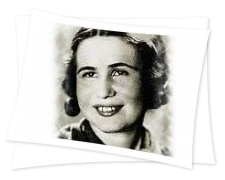
Irena Sendler
But in 1942, the Nazis herded hundreds of thousands of Jews into a 16-block area that came to be known as the Warsaw Ghetto. The Ghetto was sealed and the Jewish families ended up behind its walls, only to await certain death. Irena Sendler was so appalled by the conditions that she joined Zegota, the Council for Aid to Jews, organized by the Polish underground resistance movement, as one of its first recruits and directed the efforts to rescue Jewish children.

To be able to enter the Ghetto legally, Irena managed to be issued a pass from Warsaws Epidemic Control Department and she visited the Ghetto daily, reestablished contacts and brought food, medicines and clothing. But 5,000 people were dying a month from starvation and disease in the Ghetto, and she decided to help the Jewish children to get out. For Irena Sendler, a young mother herself, persuading parents to part with their children was in itself a horrendous task. Finding families willing to shelter the children, and thereby willing to risk their life if the Nazis ever found out, was also not easy.
Irena Sendler, who wore a star armband as a sign of her solidarity to Jews, began smuggling children out in an ambulance. She recruited at least one person from each of the ten centers of the Social Welfare Department. With their help, she issued hundreds of false documents with forged signatures. Irena Sendler successfully smuggled almost 2,500 Jewish children to safety and gave them temporary new identities.
Some children were taken out in gunnysacks or body bags. Some were buried inside loads of goods. A mechanic took a baby out in his toolbox. Some kids were carried out in potato sacks, others were placed in coffins, some entered a church in the Ghetto which had two entrances. One entrance opened into the Ghetto, the other opened into the Aryan side of Warsaw. They entered the church as Jews and exited as Christians. "`Can you guarantee they will live?'" Irena later recalled the distraught parents asking. But she could only guarantee they would die if they stayed. "In my dreams," she said, "I still hear the cries when they left their parents."
Irena Sendler accomplished her incredible deeds with the active assistance of the church. "I sent most of the children to religious establishments," she recalled. "I knew I could count on the Sisters." Irena also had a remarkable record of cooperation when placing the youngsters: "No one ever refused to take a child from me," she said. The children were given false identities and placed in homes, orphanages and convents. Irena Sendler carefully noted, in coded form, the childrens original names and their new identities. She kept the only record of their true identities in jars buried beneath an apple tree in a neighbor's back yard, across the street from German barracks, hoping she could someday dig up the jars, locate the children and inform them of their past.
In all, the jars contained the names of 2,500 children ...
But the Nazis became aware of Irena's activities, and on October 20, 1943 she was arrested, imprisoned and tortured by the Gestapo, who broke her feet and legs. Pawiak Prison, but no one could break her spirit. Though she was the only one who knew the names and addresses of the families sheltering the Jewish children, she withstood the torture, that crippled her for life, refusing to betray either her associates or any of the Jewish children in hiding. Sentenced to death, Irena was saved at the last minute when Zegota members bribed one of the Gestapo agents to halt the execution. She escaped from prison but for the rest of the war she was pursued by the Nazis.
After the war she dug up the jars and used the notes to track down the 2,500 children she placed with adoptive families and to reunite them with relatives scattered across Europe. But most lost their families during the Holocaust in Nazi death camps. The children had known her only by her code name Jolanta. But years later, after she was honored for her wartime work, her picture appeared in a newspaper. "A man, a painter, telephoned me," said Sendler, "`I remember your face,' he said. `It was you who took me out of the ghetto.' I had many calls like that!"
Irena Sendler did not think of herself as a hero. She claimed no credit for her actions. "I could have done more," she said. "This regret will follow me to my death." She has been honored by international Jewish organizations - in 1965 she accorded the title of Righteous Among the Nations by the Yad Vashem organization in Jerusalem and in 1991 she was made an honorary citizen of Israel. Irena Sendler was awarded Poland's highest distinction, the Order of White Eagle, in Warsaw Monday Nov. 10, 2003, and she was announced as the 2003 winner of the Jan Karski award for Valor and Courage. She has officially been designated a national hero in Poland and schools are named in her honor. Annual Irena Sendler days are celebrated throughout Europe and the United States.
In 2007, she was nominated to receive the Nobel Peace Prize. At a special session in Poland's upper house of Parliament, President Lech Kaczynski announced the unanimous resolution to honor Irena Sendler for rescuing "the most defenseless victims of the Nazi ideology: the Jewish children." He referred to her as a "great heroine who can be justly named for the Nobel Peace Prize. She deserves great respect from our whole nation."
During the ceremony Elzbieta Ficowska, who was just six months old when she was saved by Irena Sendler, read out a letter on her behalf: “Every child saved with my help is the justification of my existence on this Earth, and not a title to glory,” Irena Sendler said in the letter, “Over a half-century has passed since the hell of the Holocaust, but its spectre still hangs over the world and doesn’t allow us to forget.”
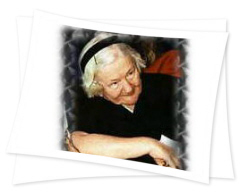
Irena Sendler
The Nobel Prize recipient, Holocaust survivor Elie Wiesel, has dedicated his life to ensuring that none of us forget what happened to the Jews. He wrote:
Link: www.auschwitz.dk/sendler.htm
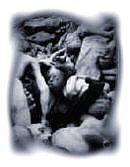
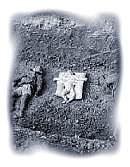
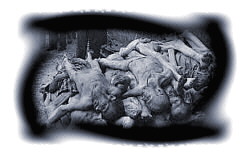



 Wisdom, compassion, morals and culture do not discriminate between race and age; as long as you study hard, you will get results. If you have a good view and principle in life, after a long time it will develop into your own concept, and with a perfect concept, your future will be very bright.
Wisdom, compassion, morals and culture do not discriminate between race and age; as long as you study hard, you will get results. If you have a good view and principle in life, after a long time it will develop into your own concept, and with a perfect concept, your future will be very bright.
 I remember that back then we heaped all blame on my father (left). Only my eldest sister, Yoke Yin, understood, so apart from her, my father was estranged from the rest of his children. But even though we were young, we also knew that these were grown-up matters, and it was not easy for us to judge.
I remember that back then we heaped all blame on my father (left). Only my eldest sister, Yoke Yin, understood, so apart from her, my father was estranged from the rest of his children. But even though we were young, we also knew that these were grown-up matters, and it was not easy for us to judge. After entering prison, my father (right) came to see me a few times. He looks much older now. He cried often when we met. I know he blames himself. As for me, I have let go of the past resentment. In my heart, I only have gratitude.
After entering prison, my father (right) came to see me a few times. He looks much older now. He cried often when we met. I know he blames himself. As for me, I have let go of the past resentment. In my heart, I only have gratitude. Although I could not see my mother (right in photo) smiling, I am happy to hear this from my brother. Whether my mother will find out about my real situation in the end (that I'm on death row), we will let things take its course.
Although I could not see my mother (right in photo) smiling, I am happy to hear this from my brother. Whether my mother will find out about my real situation in the end (that I'm on death row), we will let things take its course.